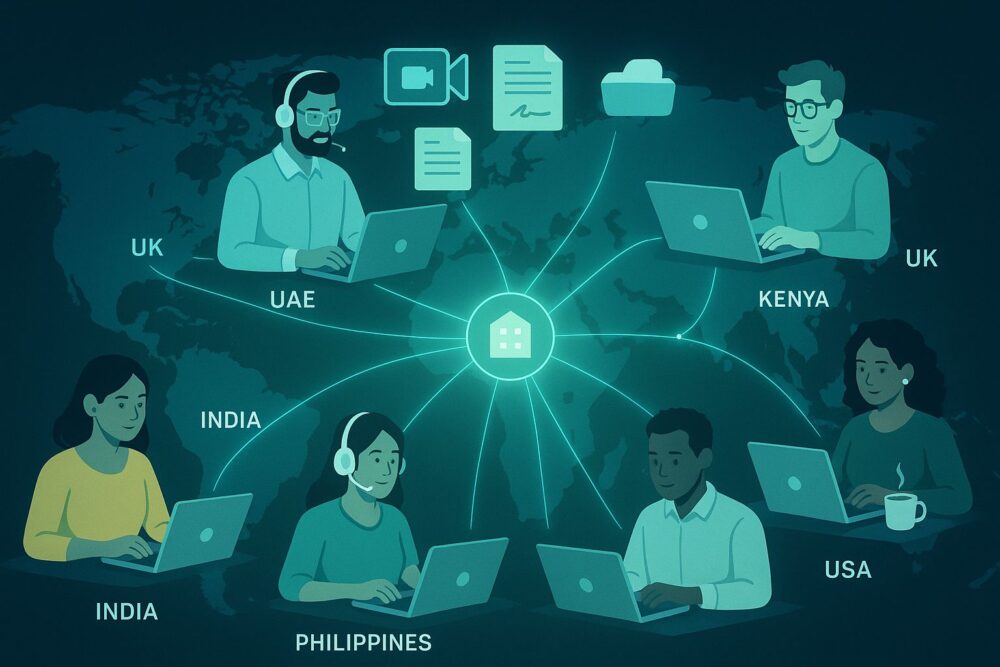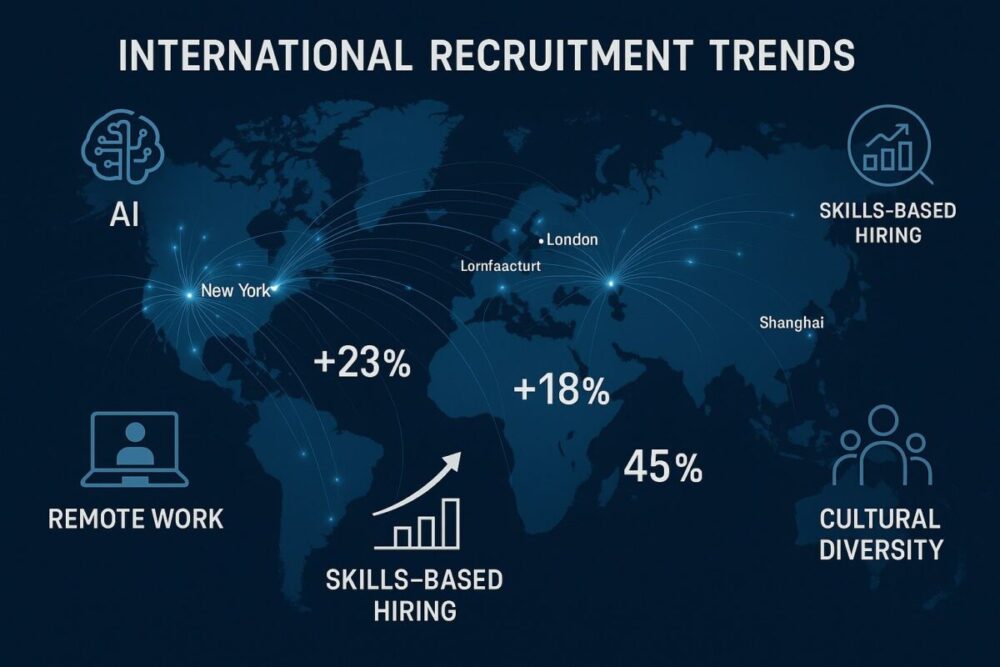International Recruitment Trends 2025 What’s Changing
International Recruitment Trends 2025: The global talent acquisition landscape is undergoing unprecedented transformation as organisations worldwide adapt to new workforce dynamics, technological innovations, and changing employee expectations. Understanding international recruitment trends 2025 has become essential for companies seeking to build competitive teams while navigating complex cross-border hiring challenges.
The convergence of remote work normalisation, artificial intelligence integration, and evolving immigration policies creates both opportunities and challenges for international recruitment strategies. Organisations that recognise and adapt to these trends position themselves for superior talent acquisition outcomes while building resilient, globally distributed teams.
Modern international recruitment requires sophisticated approaches that combine technology leverage with human insight, cultural intelligence, and strategic planning. The most successful organisations embrace these evolving trends while maintaining focus on candidate experience and long-term retention strategies.
International Recruitment Trends 2025: Technology-Driven Recruitment Evolution
Artificial Intelligence and Automation
International Recruitment Trends 2025: AI-powered screening tools have revolutionised initial candidate assessment, enabling organisations to process thousands of international applications efficiently while identifying top candidates based on sophisticated matching algorithms. These international recruitment trends 2025 demonstrate how technology enhances rather than replaces human decision-making.
Automated interview scheduling across multiple time zones streamlines the complex logistics of international recruitment while ensuring candidate convenience and recruiter efficiency. This technology proves particularly valuable for organisations hiring across continents with significant time zone differences.
Language processing capabilities enable better assessment of multilingual candidates while identifying communication skills essential for international roles. Advanced systems can evaluate written communication quality, cultural fit indicators, and technical competency through automated analysis.
Predictive analytics helps organisations identify candidates most likely to succeed in international assignments while forecasting retention rates and performance outcomes. This data-driven approach reduces placement risks while improving long-term hiring success rates.
Video Technology and Virtual Assessment Trends in 2025
Advanced video interviewing platforms enable comprehensive candidate evaluation without geographic constraints, making international recruitment more accessible and cost-effective for organisations of all sizes. These tools often include recording capabilities for collaborative decision-making.
International Recruitment Trends 2025: Virtual reality assessment centres provide immersive evaluation experiences that test candidates’ abilities to handle complex scenarios relevant to international business environments. This technology proves particularly valuable for senior executives and specialised technical roles.
Real-time collaboration tools enable hiring teams distributed across multiple countries to evaluate candidates collectively while maintaining consistent assessment standards and decision-making processes.
Cultural competency assessment through digital platforms helps evaluate candidates’ ability to work effectively in diverse international environments while identifying potential adaptation challenges.
Remote Work Impact on Global Hiring
Global hiring trends: Geographic Boundary Elimination
International Recruitment Trends 2025: The normalisation of remote work has fundamentally changed international recruitment trends 2025 by enabling organisations to hire top talent regardless of geographic location while reducing relocation costs and visa complexities.
Time zone optimisation strategies help organisations build distributed teams that provide extended operational coverage while ensuring adequate collaboration opportunities for team effectiveness and cultural integration.
Digital nomad talent pools offer organisations access to experienced professionals who combine location independence with strong work capabilities, often bringing diverse cultural perspectives and adaptive skills valuable for international business.
Hybrid work models create opportunities for partial relocation or rotation assignments that provide international experience while maintaining flexibility for both employees and employers.
Compensation and Benefits Evolution
International Recruitment Trends 2025: Location-based pay strategies require sophisticated analysis of local market conditions, cost of living differences, and tax implications while ensuring equitable compensation across international team members.
Global benefits platforms enable organisations to provide consistent, valuable benefits packages across multiple countries while complying with local regulations and cultural expectations.
Currency fluctuation management becomes essential for international recruitment as organisations develop strategies for managing compensation consistency during economic volatility and exchange rate changes.
Tax optimisation services help both employers and employees navigate complex international tax obligations while ensuring compliance with multiple jurisdiction requirements.
Skills-Based Hiring Revolution
Core Competency Focus
International recruitment trends 2025 emphasise skills verification over traditional credential evaluation, enabling organisations to identify talent from diverse educational and professional backgrounds worldwide.
Portfolio-based assessment enables candidates to demonstrate capabilities through actual work samples rather than relying solely on resume content or interview performance, particularly valuable for creative and technical roles.
Micro-learning and certification validation help organisations identify candidates who maintain current skills through continuous learning rather than depending only on formal educational credentials.
Cross-cultural competency assessment evaluates candidates’ ability to work effectively in international environments while adapting to different communication styles and business practices.
Industry-Specific Skill Demands
International Recruitment Trends 2025: Technology sector recruitment focuses increasingly on AI literacy, cloud computing expertise, and cybersecurity capabilities as organisations worldwide digitise operations and protect against growing security threats.
Healthcare international recruitment emphasises telemedicine capabilities, digital health literacy, and cross-cultural patient care skills as healthcare delivery becomes increasingly globalised and technology-enabled.
Financial services seek professionals with cryptocurrency knowledge, regulatory technology expertise, and sustainable finance understanding as the industry evolves rapidly across international markets.
Manufacturing and logistics require expertise in automation, supply chain digitisation, and sustainability practices as these industries transform to meet changing consumer and regulatory demands.
Cultural Intelligence and Diversity
Inclusive Hiring Practices
International Recruitment Trends 2025: Bias reduction strategies in international recruitment ensure organisations access the full global talent pool while building diverse teams that enhance creativity, problem-solving, and market understanding.
Cultural adaptation support helps international hires integrate successfully while maintaining their unique perspectives and contributions that provide competitive advantages for globally-minded organisations.
Language support programs enable organisations to hire exceptional talent whose primary language differs from the organisational standard while providing development opportunities that enhance long-term career success.
Mentorship networks connect international hires with experienced professionals who can guide cultural navigation, career development, and organisational integration.
Global Team Integration
International Recruitment Trends 2025: Virtual team-building activities help distributed international teams develop relationships and collaborative effectiveness despite geographic and cultural differences that could otherwise impair performance.
Cross-cultural training programs prepare both new international hires and existing team members for successful collaboration across different cultural contexts and communication styles.
Rotation and exchange programs provide team members with international experience while building organisational cultural intelligence and a global perspective that enhances business effectiveness.
Celebration of cultural diversity through organisational events and recognition programs builds inclusive environments that attract and retain top international talent.
Regulatory and Compliance Evolution
Immigration Policy Navigation
Visa process optimisation requires staying current with changing immigration policies across multiple countries while developing strategies that minimise delays and maximise success rates for international placements.
Legal compliance frameworks ensure international recruitment practices meet employment law requirements across different jurisdictions while protecting both organisations and candidates from legal risks.
Documentation standardisation streamlines international hiring processes while ensuring consistency and compliance across multiple countries’ requirements and regulatory frameworks.
Government relations management helps organisations navigate complex bureaucratic processes while building relationships that facilitate smoother international recruitment outcomes.
Future-Proofing International Recruitment
Emerging Market Opportunities
Talent pipeline development in emerging markets provides access to high-quality professionals while often offering cost advantages and unique cultural perspectives valuable for global business expansion.
Educational partnerships with international institutions create early access to emerging talent while building relationships that support long-term recruitment strategies and organisational development.
Economic zone opportunities in various countries provide favourable conditions for international business operations while creating access to local talent pools and government support programs.
Technology Integration Strategies
International Recruitment Trends 2025: Blockchain credential verification promises to streamline international recruitment by providing tamper-proof educational and professional credentials that can be verified instantly across borders.
AI-powered cultural matching algorithms help identify candidates most likely to succeed in specific international environments while reducing placement risks and improving retention rates.
Virtual reality onboarding experiences help international hires adapt to organisational culture and operational procedures before physical relocation or assignment commencement.
The evolution of international recruitment trends 2025 reflects the increasingly connected global economy, where talent mobility and cultural intelligence become competitive advantages. Organisations that embrace these trends while maintaining focus on human connection and cultural sensitivity position themselves for exceptional recruiting success.
Success requires balancing technology leverage with personal touch, global perspective with local sensitivity, and efficiency with relationship building. The future belongs to organisations that can navigate this complexity while building inclusive, high-performing international teams.



